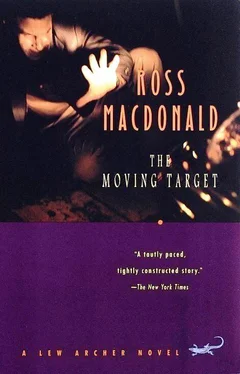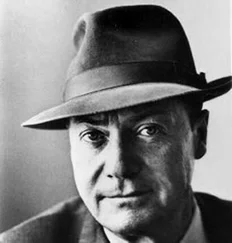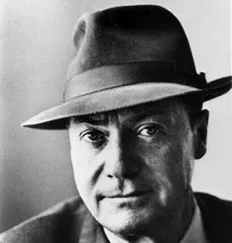Miranda was still standing above the other woman’s chair, but her posture had altered. Her body had come unstarched. One of her hands was lifted from her side toward her stepmother, not in anger. “I’m sorry, Elaine.” I couldn’t see her face.
Mrs. Sampson’s was visible. It was hard and clever. “You hurt me,” she said. “You can’t expect me to forgive you.”
“You hurt me too,” with a sobbing rhythm. “You mustn’t throw Alan in my face.”
“Then don’t throw yourself at his head. No, I don’t really mean that, and you know it. I think you ought to marry him. You want to, don’t you?”
“Yes. But you know how Father feels about it. Not to mention Alan.”
“You take care of Alan,” Mrs. Sampson said, almost gaily, “and I’ll take care of your father.”
“Will you really?”
“I give you my word. Now please go away, Miranda. I’m dreadfully tired.” She glanced at me. “All this must have been very instructive to Mr. Archer.”
“I beg your pardon?” I said. “I was admiring your private view.”
“Yes, lovely, isn’t it?” She called to Miranda, who had started out of the room: “Stay if you wish, dear. I’m going upstairs.”
She lifted a silver handbell that stood on the table beside her. Its sudden peal was like the bell at the end of a round. Miranda completed the picture by sitting down, with her face averted, in a far corner of the room.
“You’ve seen us at our worst,” Mrs. Sampson said to me. “Please don’t judge us by it. I’ve decided to do as you say.”
“Shall I call the police?”
“Bert Graves will do it. He’s familiar with all the Santa Teresa authorities. He should be here any minute.”
Mrs. Kromberg, the housekeeper, entered the room and wheeled the rubber-tired chair across the carpet. Almost effortlessly she raised Mrs. Sampson in her arms and placed her in the chair. They left the room in silence.
An electric motor murmured somewhere in the house as Mrs. Sampson ascended toward heaven.
I sat down beside Miranda on the divan in the corner of the room. She refused to look at me. “You must think we’re terrible people,” she said. “To fight like that in public.”
“You seem to have something to fight about.”
“I don’t really know. Elaine can be so sweet at times, but she’s always hated me, I think. Bob was her pet. He was my brother, you know.”
“Killed in the war?”
“Yes. He was everything I’m not. Strong and controlled and good at everything he tried. They gave him the Navy Cross posthumously. Elaine worshipped the ground he walked on. I used to wonder if she was in love with him. But of course we all loved him. Our family’s been quite different since he died and since we came out here. Father’s gone to pieces, and Elaine’s come up with this fake paralysis, and I’m all mixed up. But I’m talking much too much, aren’t I?” The turning of her half-averted head to me was a lovely gesture. Her mouth was soft and tremulous, her large eyes were blind with thought.
“I don’t mind.”
“Thank you.” She smiled. “I have no one to talk to, you see. I used to think I was lucky, with all of Father’s money behind me. I was an arrogant little bitch – maybe I still am. But I’ve learned that money can cut you off from people. We haven’t got what it takes for the Santa Teresa social life, the international-Hollywood set, and we have no friends here. I suppose I shouldn’t blame Elaine for that, but she was the one that insisted we come here to live during the war. My mistake was leaving school.”
“Where did you go?”
“Radcliffe. I didn’t fit in too well, but I had friends in Boston. They fired me for insubordination last year. I should have gone back. They would have taken me, but I was too proud to apologize. Too arrogant. I thought I could live with Father, and he tried to be good to me, but it didn’t work out. He hasn’t got along with Elaine for years. There’s always tension in the house. And now something’s happened to him.”
“We’ll get him back,” I said. But I felt that I should hedge. “Anyway, you have other friends. Alan and Bert, for example.”
“Alan doesn’t really care for me. I thought he did once – no, I don’t want to talk about him. And Bert Graves isn’t my friend. He wants to marry me, and that’s quite different. You can’t relax with a man that wants to marry you.”
“He loves you, by all the signs.”
“I know he does.” She raised her round, proud chin. “That’s why I can’t relax with him. And why he bores me.”
“You’re asking for a hell of a lot, Miranda.” And I was talking a hell of a lot, talking like somebody out of Miles Standish. “Things never work out quite perfectly no matter how hard you push them. You’re romantic, and an egotist. Some day you’ll come down to earth so hard you’ll probably break your neck. Or fracture your ego, anyway, I hope.”
“I told you I was an arrogant bitch,” she said, too lightly and easily. “Is there any charge for the diagnosis?”
“Don’t go arrogant on me now. You already have once.”
She opened her eyes very wide in demure parody. “Kissing you yesterday?”
“I won’t pretend I didn’t like it. I did. But it made me mad. I resent being used for other people’s purposes.”
“And what were my sinister purposes?”
“Not sinister. Sophomore stuff. You should be able to think of better ways to fascinate Taggert.”
“Leave him out of this.” Her tone was sharp, but then she softened it. “Did it make you very mad?”
“This mad.”
I took hold of her shoulders with my hands, of her mouth with mine. Her mouth was half open and hot. Her body was cool and firm from breast to knee. She didn’t struggle. Neither did she respond.
“Did you get any satisfaction out of that?” she said, when I released her.
I looked into her wide green eyes. They were candid and steady, but they had murky depths. I wondered what went on in those sea depths, and how long it had been going on.
“It salved my ego.”
She laughed. “It salved your lips, at least. There’s lipstick on them.”
I wiped my mouth with my handkerchief. “How old are you?”
“Twenty. Old enough for your sinister purposes. Do you think I act like a child?”
“You’re a woman.” I looked at her body deliberately – round breasts, straight flanks, round hips, straight round legs – until she squirmed. “That involves certain responsibilities.”
“I know.” Her voice was harsh with self-reproach. “I shouldn’t fling myself around. You’ve seen a lot of life, haven’t you?”
It was a girlish question, but I answered her seriously. “Too much, of one kind. I make my living seeing a lot of life.”
“I guess I haven’t seen enough. I’m sorry for making you mad.” She leaned toward me suddenly and kissed my cheek very lightly.
I felt a letdown, because it was the kind of kiss a niece might give to an uncle. Well, I had fifteen years on her. The letdown didn’t last. Bert Graves had twenty.
There was the sound of a car in the drive, then movement in the house.
“That must be Bert now,” she said.
We were standing well apart when he entered the room. But he gave me a single glance, veiled and questioning and hurt, before he found control of his face. Even then there were vertical lines of anxiety between his eyebrows. He looked as if he hadn’t slept. But he moved with speed and decision, cat-footed for a heavy man. His body, at least, was glad to get into action. He said hello to Miranda and turned to me.
“What do you say, Lew?”
“Did you get the money?”
He took the calfskin brief case from under his arm; unlocked it with a key, and dumped its contents on the coffee table – a dozen or more oblong packages wrapped in brown bank paper and tied together with red tape.
Читать дальше












